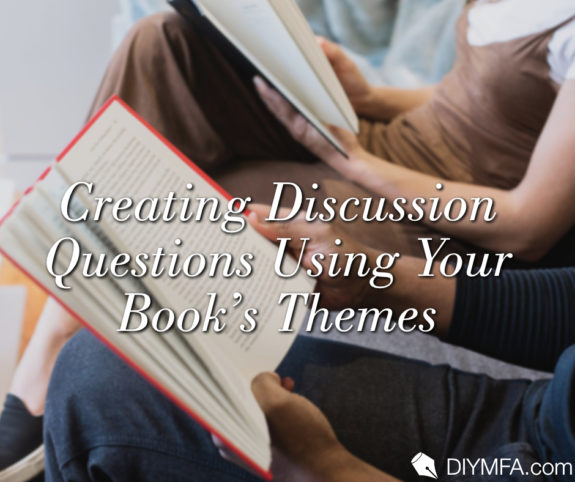Do you love talking about the books you read with friends, classmates, or your book club? (I know. All of us word nerds love to do this, right?) So maybe you’ve noticed, either online or in the back matter of some of the books you own, that authors or publishers sometimes share discussion questions for the respective book. These questionnaires are designed to encourage readers to think deeply about the plot, characters, symbols, and so on and then talk about the ideas and topics explored. In that way, discussion questions are also a fun and interactive way of marketing a book. Maybe you’ve even thought of creating your own questionnaire for your own book.
The catch, of course? Developing that list of questions can be HARD. Even if you’ve worked on your book for years and know it inside out, you may wonder which ideas or questions will prompt deep and insightful conversation among readers . . . or where to even start with making your list.
But here’s the good news. You already have an excellent place to start: your book’s literary themes.
Yes, knowing your book’s big ideas is key to creating a fantastic list of thought-provoking questions. Don’t worry if you haven’t thought about the themes before, though. In this post, we’ll offer suggestions on which storytelling elements (a.k.a. sources) to review and what questions you can ask yourself so you can identify the themes and figure out what, in your opinion, is most important for your audience to talk about.
Review Your Book’s Plot or Structure
With fiction books and some memoirs, the plot can be a treasure trove of discussion question possibilities. The big events that move the story forward are often the juiciest ones to analyze, especially if the protagonist’s choices or actions cause those events to happen. But sometimes, other plot points that seem less significant are just as noteworthy because of the themes they unearth. Chances are those themes will be the same ones that are explored in the more major events.
How you tackle your review of the plot for discussion question ideas is up to you. You can start with the main plot points, such as the inciting incident, the end of Act I, or the dark night of the soul. Or you can focus on your favorite moments of the story, including game-changing revelations or meaningful exchanges of dialogue or interactions between characters. However you approach this process, use the suggestions below to brainstorm potential discussion questions based on the plot (thought don’t feel obligated to create a question for each of these):
- How is this event significant or meaningful to the overall story? What theme(s) is demonstrated in this event?
- What do the protagonist, the antagonist (if one exists), and supporting characters do during this event? How does this tie into the theme(s) explored?
- What scene(s) may draw conflicting opinions from readers? Could readers have different thoughts on the theme(s) emerging from this event?
- What events may shock or surprise the reader? If so, how and why? How does this impact the way in which any theme(s) is explored?
- How might the reader be able to relate to certain plot events based on their own experiences with the theme(s) explored?
- What else is interesting or important for the reader to consider regarding this event?
Now, what if you’re writing nonfiction that has a clear structure but no plot, so to speak? (A great example of this is Susan Cain’s Quiet.) Instead of looking for plot events, choose the most salient moments in the book—arguments you make, examples or anecdotes you share, notable facts or quotes from other sources—and see what themes emerge. Then determine which of the above questions you can reframe for your purposes. At the same time, remember that your discussion questions aren’t meant to quiz your audience about the details of your book. Rather, invite them to consider how the information you share impacts them and the world at large, as well as why it’s worth discussing in the first place.
Revisit Your Characters
If there’s one storytelling element that readers LOVE talking about most, it’s the characters they “meet.” We can’t help but gush about who our favorite characters are and why, or share memorable snippets of that character’s dialogue. So why not encourage your readership to talk about your characters by means of your discussion questions?
Just as the plot’s events illustrate your book’s themes, your characters—especially the protagonist—will be moving, breathing examples of those big ideas. Each character’s actions, decisions, motivations, thoughts and speech, and lessons learned don’t just reveal the themes. They influence those overarching concepts from the very beginning. So as you look to your characters for possible discussion questions, ask yourself—or maybe the even the characters themselves—any of the following:
- What is the protagonist’s motivation or goal? What theme(s) does it demonstrate?
- What kind of journey does this character take (externally and internally) during the book? How does the character change between Page One and The End? What theme(s) emerge from this arc?
- How do the protagonist’s relationships with other characters (e.g., love interest, mentors, family members, friends, the antagonist) influence the book’s themes? What about these relationships or interactions is critical for your readers to talk about?
- What attributes, actions, or choices from the protagonist or other major characters could draw conflicting opinions from readers? How could this create an in-depth group discussion, regardless of whether it reflects a specific theme?
- What character revelations may shock or surprise readers? If so, how and why? Do they reflect any of the story’s themes? Regardless, how could this foster an interesting discussion between readers?
- What are the most important pieces of dialogue from the book? Why is each quote significant? What theme(s) does each quote reflect?
Other Storytelling Elements
Plot and characters aren’t the only sources of theme in your book. Nor are they the only seeds that can inspire discussion questions. Other crucial elements can reflect the themes and lead to engaging discussions among your readers. So as you review your book for possible questions, consider what else influences your story’s themes besides the first two elements we covered. Here are a few suggestions:
- Setting: How does the book’s setting (location, time period, etc.) influence the themes? What events, characters, etc. are featured specifically because of the setting? (If you’re writing fiction or nonfiction that’s historical in nature, setting-related questions are a must for your questionnaire.)
- Worldbuilding: If you’re working on speculative fiction, what aspects of the story world (e.g., government/power structures, religion, magic system, culture) influence the story’s themes? How do these aspects play a pivotal role in the story? What will readers remember most about this world when they finish reading your book?
- Symbolism: What objects act as symbols? What theme(s) does each one represent?
- Title: Why did you choose your book’s title? Does it hint at any of the themes?
- Other Repeating Elements: What ideas or elements appear repeatedly throughout the book? Why are they important? Which theme(s) do they influence?
Here’s a great example of repeating elements: When I was editing Julie Jacky’s memoir On the Other Side, one aspect of the book that moved me was how Julie’s journey of healing and forgiveness after childhood sexual abuse was full of mentors, from mindset coaches and therapists to spiritual mediums and even her chiropractor. Sometimes Julie had sought out their help and guidance. Other times, she had serendipitously received what she needed at the time. So when Julie later asked me to develop book club questions for On the Other Side, I included a question about mentors, asking readers to talk about the impact Julie’s mentors had on her and to consider the mentors in their own lives.
Meaningful Questions Lead to Meaningful Discussions
Obviously there’s more to consider than the book’s themes when creating discussion questions. For example, how should you phrase your questions? And how many should you include? No matter what, it’s a good idea to check the books you own (especially ones in the same genre as yours or that explore similar topics and themes) to see how the author or publisher handled their questionnaires. This can help you gauge how long you’d like your list to be and how to write your questions in a way that sparks the reader’s curiosity.
Above all, remember that your goal with discussion questions is to get your audience thinking about your book in deeper ways than a simple reading would. So how many questions you ask and how you word them isn’t as crucial as what you ask your readers to think about. Using the book’s themes to help you craft your questions will help you ensure that they touch on topics or ideas that are meaningful to you and your characters. And by doing this, you’ll increase the chances of nurturing equally meaningful conversations among your readers.
Have you created discussion questions for your book(s)? If you have, how did you develop those questions? If you haven’t, what plot point(s), character(s), etc. would you ask your readers to talk or think about? What themes would they discuss as a result?

Sara Letourneau is a freelance editor and writing coach who lives in Massachusetts. She’s also a poet whose work has appeared in Mass Poetry’s Poem of the Moment, The Aurorean, The Avocet, The Bookends Review, Golden Walkman Magazine, Soul-Lit, and other journals and anthologies. She can often be found performing her poems at local open mic nights, reading good books, roaming the shores of Cape Cod, and enjoying a cup of tea. Learn more about how Sara can help you with your writing at Heart of the Story Editorial & Coaching Services. You can also connect with her at her writer website, Twitter, Goodreads, or Instagram.







